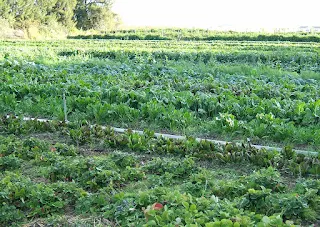Organic farming system in Republic of India isn't new and is being followed from ancient time. Itis a way of farming system that primarily geared toward cultivating the land and raising crops in such the simplest way, on keep the soil alive and in physiological state by use of organic wastes (crop, animal and farm wastes, aquatic wastes) Associate in Nursingd alternative biological materials at the side of useful microbes (biofertilizers) to unleash nutrients to crops for enlarged property production in an eco friendly pollution free atmosphere.
As per the definition of the us Department of Agriculture (USDA) study team on organic farming “organic farming could be a system that avoids or for the most part excludes the employment of artificial inputs (such as fertilizers, pesticides, hormones, feed additives etc) and to the most extent possible depend upon crop rotations,crop residues, animal manures, off-farm organic waste, mineral grade rock additives and biological system of nutrient mobilization and plant protection”.
FAO instructed that “Organic agriculture could be a distinctive production management system that promotes and enhances agro-ecosystem health, together with diversity,biological cycles and soil biological activity, and this can be accomplished by mistreatment on-farm science, biological and mechanical strategies in exclusion of all artificial off-farm inputs”.
Advantages of organic farming
organic fertilizers have several benefits. With organic fertilizers soil crusting is reduced. Organics might improve water movement into the soil and, in time, add structure to the soil. Organics feed useful microbes, thereby creating the soil easier to figure. Organic fertilizers sometimes contain several plant nutrients in low concentrations, in contrast to inorganic fertilisers, that sometimes contain solely a number of nutrients. Plants will absorb nutrients in slow and gradual manner from organic fertilizers. In inorganic fertilizers they're lost from the soil quickly, you'll ought to apply it many times throughout the season unless you utilize a specially developed,slow-release kind.
Organic pesticides ar low value, simply degradable,rapid decomposition by daylight, Has the result / influence quickly, stopping craving albeit insects seldom cause death. typically low to animals and comparatively safe in humans. encompasses a broad spectrum of management (and nervous abdomen poison) and is selective. may be relied upon to beat cuss immune to artificial pesticides. Phytotoxicity is low. they need slow result on insects. So, again and again we've got to use.
The chemical residues ar low in organic food. Organic turn out generally carries considerably fewer chemical residues than will standard turn out.
Food additives: Organic rules ban or severely limit the employment of food additives, process aids (substances used throughout process, however not value-added on to food) and invigorating agents normally employed in non-organic foods, together with preservatives, artificial sweeteners, colorings and flavorings, and MSG.
Environment: Some individuals purchase organic food for environmental reasons. Organic farming practices ar designed to learn the atmosphere by reducing pollution and preserving water and soil quality
Disadvantages of organic farming
Farming practices more-expensive in organic farming.
Organic fertilizers sometimes contain several plant nutrients in low concentrations. several of those nutrients ought to be convertedinto inorganic forms by soil microorganism and fungi before plants will use them, so that they generally ar additional slowly discharged, over time. in contrast to inorganic fertilizers they're not in targeted type. terribly low convenience of nutrient percentages. it's out of the question to use a selected essential nutrient to correct the deficiencies.Also it's out of the question to use in desired levels. Inorganic fertilizers ar straightforward to use desired nutrient at desired levels.
Plants cannot absorb organic fertilizers in and of itself. Plants and microbes ought to remodel the organic fertilizers to inorganic type in order that plants will absorb promptly.
Organic turn out has chemical residues too. Organic food isn't entirely freed from chemical residues. Residues on most products— each organic and nonorganic — do not exceed government safety thresholds
One of the foremost troublesome things to see for Associate in Nursing organic farmer is what quantity fertiliser to use supported every nutrient demand.
As the yield productivity is a smaller amount in organic farming the price of food is incredibly high.
The researchers over that organically and conventionally made foodstuffs don't seem to be considerably totally different in their nutrient content.
Because organic fruits and vegetables are not treated with waxes or preservatives, they'll spoil quicker.

Post a Comment for "Advantages and Disadvantages of Organic Farming"